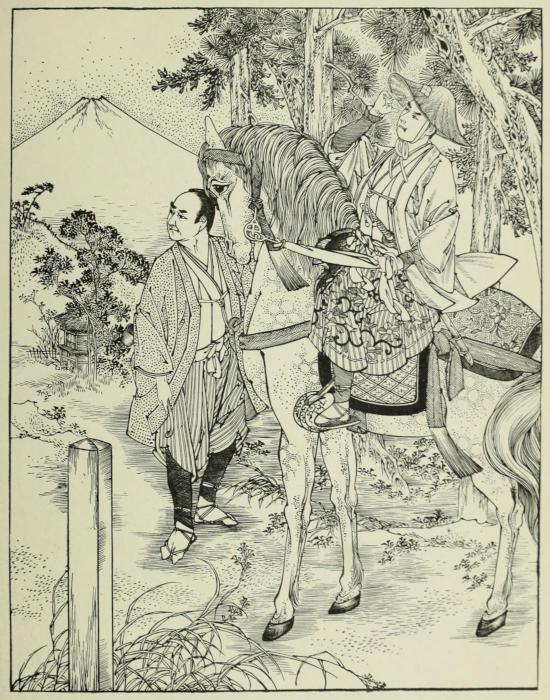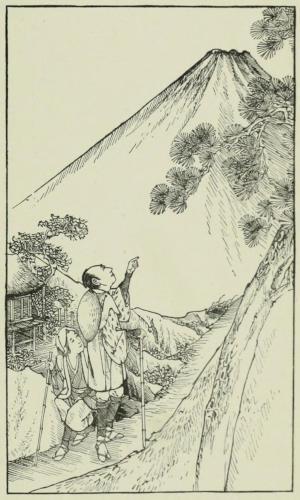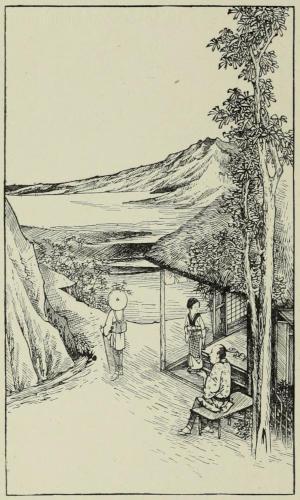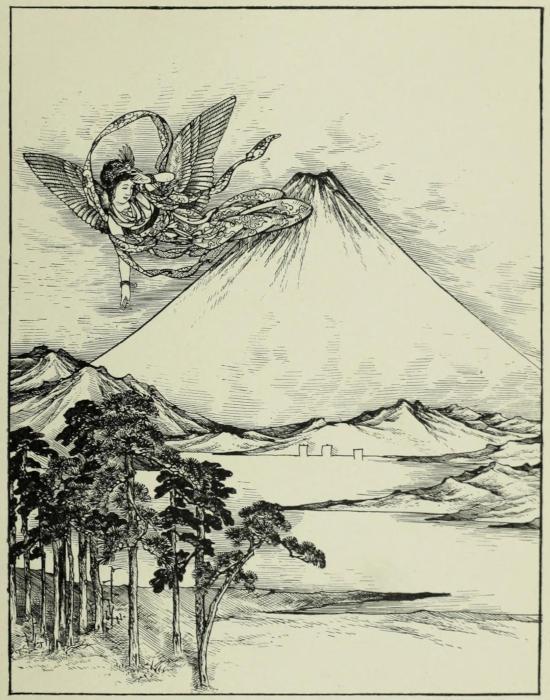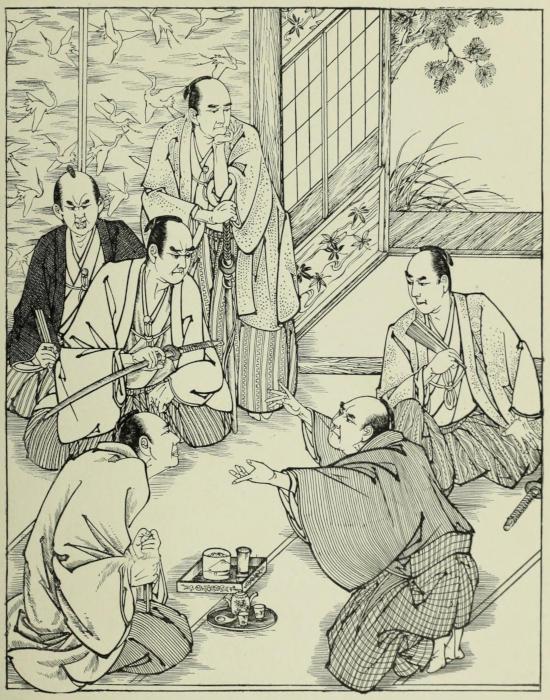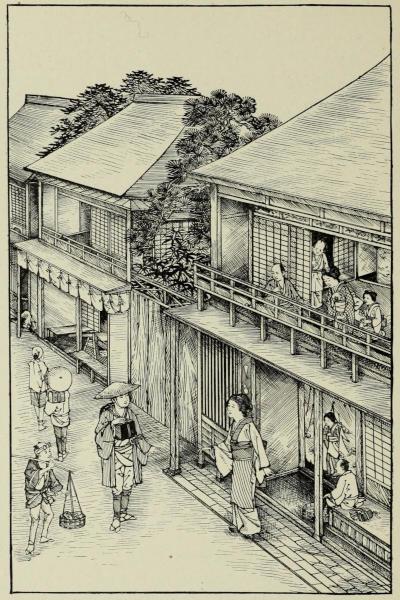Other documents randomly have different content
Kamakura, which was to be taken by storm. Meeting no opposition worthy of the name, they reached the sea-shore at Enoshima, only three miles from their destination. Here an unexpected difficulty presented itself. Although it was ebb-tide the sea ran extremely high, so that the road along the shore was submerged beneath angry waves, which washed even the steep mountain spurs from whose base they were generally separated by several hundred feet of hard, sandy soil. The only way to reach Kamakura seemed to be for them to retrace their steps by a long détour round the other side of the mountain. This course would entail loss of time and labor; but the commander-in-chief was less disturbed on that account than by the fear that this accident might be misconstrued into an evil omen, and consequently dampen the enthusiasm of his followers. For at the last moment the Hōjō had changed their tactics. They all at once showed unbounded honor and veneration for the Emperor whom they had placed upon the throne three years before, and took care to have their new-born loyalty proclaimed far and wide. They knew, as they said, that the gods from whom the Mikados sprang would never allow sacrilegious hands to be laid on their descendants, and in the changes which had been made the Hōjō had merely been instruments ordained to work out the divine will by placing the sceptre in the hands of him who could wield it to the best advantage of the country. Numbers of Hōjō spies had found their way into Nitta’s camp, where only the evening before some of them had been discovered and executed; and those undetected would certainly make the most of this unexpected impediment, causing it to be regarded as a sign of the displeasure of the gods and an augury of evil.
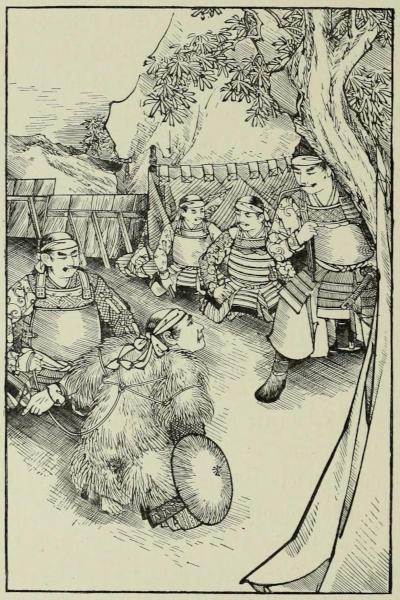
SEIZING A DISGUISED HŌJŌ SPY IN NITTA’S CAMP
Going down to where the waves washed his feet and frequently covered him with their spray, Nitta looked out over the sea long and earnestly. The white-crested billows came and went, but the lastcomer showed no sign of lagging behind those that had preceded it. Sennoske, seeing the anxiety depicted on his chief’s face, ventured to step up to him and give his opinion. He had been brought up in a seaport town, with a harbor which was none of the best, where he had been out at all times, and had learned to know the tides and the signs of the weather. Therefore he felt that he could now take it upon
himself to assert that in a few hours, or a day at most, the flood must subside. Nitta, although he appeared absorbed in thought, and scarcely to listen to his lieutenant, eagerly drank in every word the latter said; and, placing confidence in it, performed one of those acts which, trifling as they may appear, are yet emanations of genius. Exerting a purely moral force, such actions are often all-powerful in shaping the destinies of men and nations, by giving decision to the vacillating, courage to the timid, a feeling of strength which is equivalent to real force to the weak, and making heroes of those who possess manly qualities in any degree.
Taking his sword, of matchless workmanship and ornamentation, glittering in the sunlight which reflected itself in the burnished gold, Nitta cast it out into the waters as far as a warrior’s arm could throw it, asking the gods to accept it as a peace-offering, and calling upon them to give their divine aid to the army which now marched to uphold the vested and inherited rights of their descendants, the Emperors of the country. In the name of the Mikado, driven from the throne into a lonely exile, he prayed them to bid the angry waves subside and give free passage to those who came to avenge his despoilers and punish the sacrilege. It was a powerful invocation, and its effect was thorough and instantaneous, creating general and unbounded enthusiasm. If any man there had misgivings, it would have been dangerous for him to express them; and when next morning the waters had subsided, leaving the road free and open, all lingering doubts as well as the hopes of the Hōjō sympathizers vanished as the dew of the night that disappeared in the morning sun.
As they approached Kamakura, they found a large portion of the enemy’s army posted before the walls; so fierce, however, was the onslaught of Nitta’s troops that the ranks of the besieged were at once broken, and they fled for protection into the city. But the assailants were close upon them, and followed in such numbers that the gates could not be shut against them. From ward to ward, from street to street, from house to house, the Hōjō were driven, in spite of their persistent and desperate struggles, and before nightfall the city was taken.
This battle decided the war and the fate of the Hōjō. The honest portion of their adherents consisted merely of those who had been dazzled and won over by the spell of absolute power exercised for a considerable time; and this spell once broken, they fully recognized their folly as well as their guilt, and were ready to sue for and accept pardon on any terms. It was expected that the principal men of the defeated clan, together with such of their partisans and abetters as were too deeply implicated to hope for forgiveness, would form into roving bands and flee to distant inaccessible parts of the empire; but as they were now without physical or moral support, a general engagement was no longer to be feared. In view of this it was decided by Nitta to dismiss at once a part of the army, so that divisions of the retiring troops might be employed in protecting their several provinces from the marauders who should flee thither, and in hunting them down and bringing them to punishment.
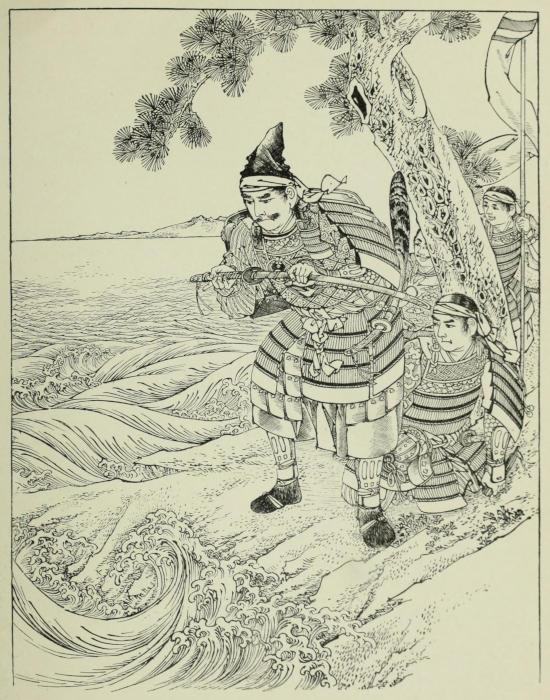
NITTA PRAYING TO THE GODS BEFORE THROWING HIS SWORD INTO THE SEA.
One of the provinces to which it was believed that the defeated would be certain to resort in large numbers was Idzu, lying to the west of the Tokaido, beyond the Hakone Mountain-range, on the road to Kuwana. Here the great Yoritomo had in his youth found an
asylum from his Taira foes. It required coolness and courage, a steady eye and a firm foot to track foes into these Idzu fastnesses, over these rugged, pathless mountains, where Nature alone offered almost insurmountable obstacles. Nitta gave a proof to the country of his confidence in Sennoske by intrusting to him the military command of that region, as well as of the country along the Tokaido from the Hakone Mountains to the province of Kuwana. The contingent from the latter province, which was to return for the purpose, was to be under his orders, together with such other troops as he might think it advisable to raise in the districts assigned. Nominally, it was necessary to have this appointment acknowledged by the daimios in whose dominions the new commander was to act; but this was merely a matter of form entailing a short delay. No one would have been willing to displease the victorious Nitta, or to incur the suspicion of being a Hōjō sympathizer, by in any way impeding the measures deemed necessary to bring the insurgents to justice.
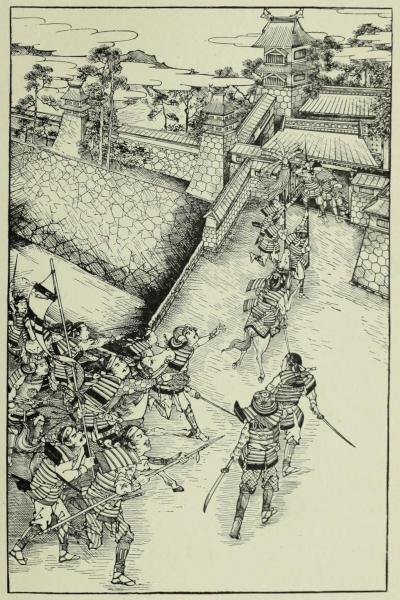
SCENE AT THE STORMING OF KAMAKURA
The delay which would ensue before he could take active command, Sennoske determined to take advantage of by returning home; and leaving the Kuwana soldiers to follow to the place which he was to make the base of his operations, he started early in the morning on the day succeeding his appointment, accompanied by Yamagawa, both mounted on good horses and attended only by two running footmen. He was in good spirits. The honors he had gained; the charm of the important command intrusted to him; the thought of meeting his father and the Duke, with the great expectations that
they entertained of him more than fulfilled in so short a time; and last, but not least, however he might try to disguise it to himself, the joy of again seeing O Tetsu,—all these were certainly good and sufficient reasons for his elation.
SENNOSKE ON HIS RETURN
Pushing on as fast as possible, on the evening of the same day he reached Odawara, a strong castle town at the northern foot of the Hakone Mountain-range. The fame of his exploits had preceded him, and the lord of the castle received him in a way which could not but be flattering to the young man, pressing him to remain at least a day or two longer. No inducement, however, could detain Sennoske; and leaving their horses, which would only have impeded their way over the mountain-passes, he started on foot the next day at dawn with his faithful henchman.
PILGRIMS TO FUJIYAMA.
The road, as it was at that time laid out, wound between the Hakone and the Ashigara Mountain-ranges; and here the young man made perhaps less haste than might have been expected. It was late in autumn, the weather was fine, the air bracing; and in spite of his
anxiety to reach his home he could not but loiter a little to view the beautiful scenery that presented itself. The mountains and hill-sides were clothed in their rich autumnal garb of gold and red and purple and brown of every shade and depth of coloring; while as if to supply the need of a stronger contrast, clusters of evergreen trees here and there reared their crowns of unchanging hue high into the air.
ROADSIDE TEA-HOUSE.
The whole effect was greatly heightened by occasional glimpses of Fuji, which presented itself under the most varying forms and expressions. Sometimes just a glimpse of its top was visible over an intervening mountain-range, while again a portion of the huge mass
FUJIYAMA, WITH ANGEL HOVERING OVER IT.
would reveal itself through a narrow gorge; sometimes one of its bleak sides, within range of the eye, but up to this moment obscured by clouds which now suddenly parted, would astonish the traveller who had just gazed at what he thought empty space, while the shifting curtain, hiding the view the next moment, would make him doubt whether he had seen aright. Two or three times the whole mountain with its perfect outline stood in majesty like a giant sentry watching over the land. With the varying beauty of scenery which each successive step thus unclosed, it was impossible for a lover of Nature like Sennoske not to stop for a moment now and then to admire it. Yet it was only for a moment, as the thought of the welcome awaiting him prevented him from lingering as he otherwise would have done. Many a good-looking young girl at the roadside tea-houses followed with strained eyes the figure of the dashing young cavalier, whose pleasant, gentle ways so well set off his unmistakably martial air. Old Yamagawa also came in for his share of attention; and now that they neared home, honored and successful, the old servitor indulged occasionally in what was probably his only fault,—a love of wine,—to a greater extent than was good for him; but his young master had not the heart to chide or even to restrain him.
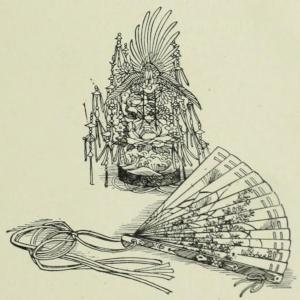
COURT LADY’S HEAD-DRESS AND STATE FAN.
CHAPTER IX.
It was late at night on the second day before Sennoske arrived at Mishima, at the foot of the other side of the mountains. The town was full of people; for besides the ordinary contingent of travellers, who always muster here in force, there were a great many samurai —some who had started too late to join the army, others, like Sennoske, already returning home—and a considerable number of Hōjō adherents fleeing in various disguises to find an asylum before pursuit was fairly organized against them. The inns and hostelries were over-crowded; but the Kuwana nobility had always enjoyed a good reputation on the road, and the charm of the young man’s manner moreover failed not in its usual effect; so at the inn at which he determined to stay, two parties of merchants, already closely packed, were forced to content themselves with even less space in order to clear a room for the new arrival. Sennoske, who was weary, at once repaired to the bath, accompanied by Yamagawa, carrying the Muramasa sword, which was never out of sight or reach of either master or servant.
After his master had retired, the old servitor also indulged in the luxury of the bath, the daily use of which in Japan is considered almost a necessity. Already half overcome by the fumes of the winecup, the hot bath and the close air of the room still further increased his stupefaction; and in returning to his apartment he staggered along the corridor in a confused, aimless manner, until, mistaking one of the passages, he stopped at the end of it before what of course was the wrong room.
The sound of unknown voices from within reached his ears; but thinking they must belong to visitors of his master, he unhesitatingly opened the paper sliding-doors, and falling on his hands and knees with his head bowed down, in the fashion of Japanese servants, he pushed the sword forward as far as he could, uttering the customary phrase, “Have you any further orders for me?” Receiving no answer,
and fearing that Sennoske had noticed his drunken condition and was displeased at his showing it before visitors,—something which heretofore had never happened,—he remained a minute or two in his prostrate position, bowing his head still lower, and muttering apologies. At last a voice which he did not recognize spoke out: “We will excuse you because you insist on being excused; but tell us first what it is that you require, and what brings you hither.”
Yamagawa looked up, and the sight that presented itself, unexpected as it was, partly sobered him. There were six or seven samurai, all unknown to him, seated on the mats; and the foremost among them, who also was the last speaker, had taken up the sword pushed towards him, and, regarding it with the eye of a connoisseur, was evidently surprised at the rich ornamentation and workmanship.
“Give me back my sword,” Yamagawa cried; “it belongs to my master, and I am responsible for it. Give it back to me, oh! please give it back to me at once,” he repeated, raising his voice and eagerly holding out his hands.
“Gently, my man! Of course I shall give it back to you,” said the other; “but do not be so importunate, and do not speak so loudly before your superiors, or you will have to be taught better manners. Who is your master?”
“His name is Sennoske Mutto, from Kuwana, and he is just returning home from the war,” was the reply. “This is a Muramasa sword, which he values highly, and he will begin to be anxious about it; so please give it back to me at once,” pleaded the old man. He was still partly under the influence of wine; and this fact, together with the mortification of his position and the anxiety and irritation under which he labored, had made him forget discretion, common sense, and his dignity as a samurai, all other considerations being merged and lost in his impatient eagerness to regain possession of the cherished weapon.
“A Muramasa sword, and your master intrusts it to a drunken fool like you!” said another of the party, who until now had been sitting in the rear of his companions, but who now moved forward to where the light fell fully upon him. “Does he attach so little value to it, in
spite of what you say, as to leave it like a toy in the hands of one who in his cups would not mind trading it off for a measure of wine? His opinion differs from mine as to the care which he ought to bestow upon it. Be off! and tell your master that if he wants this sword he must come for it himself.”
What was it which, at the sight of the new speaker and at the first word uttered by him, made the old man look as if petrified with horror and stupefaction, clammy perspiration bathing his face, while his hair literally stood on end? Only his eyes spoke; and although fastened with almost stony fixedness upon the man who had just addressed him, they yet had an expression of such intense, deadly hatred that the other, as he fairly caught sight of it, involuntarily recoiled a step and laid his hand on the sword he carried at his side.
DISCOVERING HIS MISTAKE.
Gradually, by a series of sharp, convulsive movements, Yamagawa’s form and features relaxed from their rigid cast, and it was evident that a full consciousness of his position and surroundings was slowly taking hold of him, and that as it did so he
YAMAGAWA
was making powerful efforts to regain his self-control. Every trace of drunkenness had disappeared, and it was only extreme mental and nervous excitement which made his voice tremble when he again spoke:—
“Give me back the sword, Taka Suke; and after returning it to my young master, I will try to refrain from telling him or his father that I have again met you. Perhaps I am selfish enough not to wish to stand disgraced before one in the service of whose family I have become old and gray, whose welfare has occupied every thought of my mind, to whom every fibre of my body is devoted, and for whose sake I would willingly shed my blood drop by drop. Perhaps I have become too feeble in mind as well as in body fully to realize the duties of a samurai, for I would fain save my young master from facing one who has been the curse of his house, instead of doing my utmost to bring about a meeting, so that he could either kill you or fall as a samurai should. As for me, I know I shall not long be able to endure the thought of having met you and not only failed myself to take vengeance, but even shielded you against punishment by those whose right and duty it is to inflict it. For twelve years there has never been a day when you have been absent from my thoughts, and I could never think of you without cursing you. Yet all the sufferings I have so far endured are as nothing compared with the humiliating misery of this hour, when I find myself compelled, through my own fault, to plead to one who has caused blight and ruin to fall upon those I love and hold dear.”
“I will give you still further reason to curse me, then,” said the other. “The gods seem kind to me; for although our cause has failed, I am still able to strike at the only one whom, from some foolish whim, I spared, leaving him life and liberty when I had the power to take both. So Numa is still alive, and you now serve his son. Well, the brat has his father’s courage, as he showed in the war; and I have no doubt he has also the same conceit. Curse you all, with your pretended fine feelings and virtues, which you constantly flaunt before our eyes! They will not impose upon me, however. Go, and repeat to your master what has been told to you here; go, and tell him that if he knows a samurai’s duties, of which his father always
prated so much, he must be aware that a drunkard is not fit to be intrusted with a sword, least of all with one like this. Go, and tell him that if he cares for it more than you seem to have done, he must come and humbly beg for it himself.”
There was somewhat of truth in this taunt, which the devilish cunning of the other had formulated so as to make it more cutting than the keenest-edged weapon. Seeing from the tenor of it that all further parley would be useless, Yamagawa without another word or look made his way back to his master’s room. As he entered, Sennoske started in amazement and affright at the change which half an hour had effected in the appearance of his old servant. The signs of acute physical pain, as well as of mental anguish, were graven in deep lines on his features, and spoke with equal emphasis out of his hollow, sunken eyes; shuffling along as he did on his right side, with his right hand convulsively clasping his left bosom, it is probable that the terrible ordeal through which he had passed, had brought on a partial heart-stroke. Yet overlying all these manifestations of suffering, which became almost tangible and somatic as it were by comparison, there was a look of utter, hopeless despair,—such a look as is seen in certain types of incurable madness; such a look as hunters see in some animals hunted down to the last stages of exhaustion, with the dogs fastening on them, and no hope of escape.
In a sufficiently coherent way to make himself understood, Yamagawa explained the circumstances attending the loss of the sword, without, however, hinting at the identity of the samurai whom he had recognized among his despoilers. Sennoske, although greatly annoyed and angry at the impudence of the demand transmitted to him, showed no outward signs of perturbation, and in reality a sincere pity for the poor old man before him mastered every other emotion. From the version given to him, he could of course scarcely understand why this accident, although implying a serious neglect of duty on the part of Yamagawa according to the code then prevailing, should yet have affected the old servitor in such a terrible way; and in spite of the latter’s urgent solicitation to go at once about the recovery of his weapon, he stayed to console and cheer him.
ROADSIDE HOTEL
“Sorrow is bad for old age,” he said; “it withers up the tree of life quicker and surer than the cold north winds wither the blooming chrysanthemum. Cheer up, and do not let me see you so downcast at this trumpery business, especially now that we are nearing home. As soon as I have regained my sword, I shall feel like teaching these gentry a lesson at which you may have to assist me; so—”
“Yes, as soon as you have regained possession of your sword,” said the other, interrupting him. “Oh, pray, my dear master, go at
once! this suspense is horrible.”
Sennoske at these words started up, filled with dark forebodings. He felt that there must be something more in this affair than he yet apprehended, and he hesitated no longer. Calling a servant, he had himself conducted to the room which Yamagawa had mistakenly entered; and announcing his name, made a fair apology for what had occurred, and courteously but firmly asked for the return of his sword. Taka Suke, who had sent him the message to come, and who was evidently the leader of the party, replied to him in what was plainly a prepared speech:—
“I have heard of you, Sennoske, and of the renown which you have gained on the field of battle; but it seems to me that, in spite of this, you are greatly deficient in the duties and obligations of a samurai. Courage and bravery and prowess in battle are common enough in our country; but a sword like this of yours is rarely found, and its possession probably more than any quality of your own has helped you to achieve success and renown. You know the old saying, ‘The sword is the soul of the samurai.’ It owes its origin to a feeling hallowed by the custom of centuries,—a feeling which has been outraged by the careless, negligent way in which this treasure has been handled. Your youth and inexperience may plead in extenuation of yourself, but the fault of your retainer, who is a samurai, and old enough to know his duty, cannot be condoned; and we will listen to no demand for the restoration of this blade unless it is accompanied by the head of that drunken brute through whose culpable carelessness it might easily have been lost or spoiled.”
“But this is preposterous,” Sennoske rejoined; “this is horrible! You surely cannot mean what you say—and yet the life of a faithful old retainer is not a fit subject for sport. I recollect him from the day when consciousness first dawned upon me; memory recalls him as watching over my childhood, guiding and instructing my early youth, in the most disinterested, self-sacrificing way. I would willingly risk my life for him at any moment; and sword was never yet forged, nor ever will be, which could weigh equally in the balance with such faithfulness and such devotion as he has always shown. I respect your feelings; but this man has suffered more than enough already
Welcome to our website – the ideal destination for book lovers and knowledge seekers. With a mission to inspire endlessly, we offer a vast collection of books, ranging from classic literary works to specialized publications, self-development books, and children's literature. Each book is a new journey of discovery, expanding knowledge and enriching the soul of the reade
Our website is not just a platform for buying books, but a bridge connecting readers to the timeless values of culture and wisdom. With an elegant, user-friendly interface and an intelligent search system, we are committed to providing a quick and convenient shopping experience. Additionally, our special promotions and home delivery services ensure that you save time and fully enjoy the joy of reading.
Let us accompany you on the journey of exploring knowledge and personal growth!
















